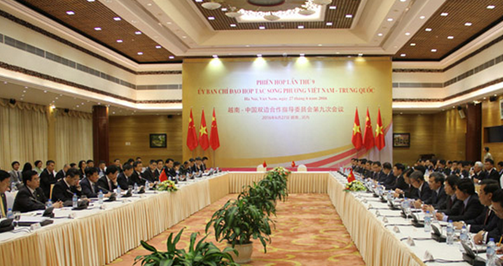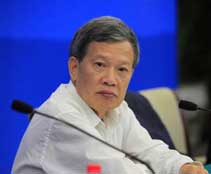By Ling Dequan, researcher with Center for World Affairs Studies, Xinhua News Agency

The 9th Meeting of the China-Vietnam Steering Committee for Bilateral Cooperation had concluded on June 27, which resulted in fruitful achievements.
The two parties agreed to utilize the existing inter-governmental mechanism to maintain peace in the South China Sea with amicable negotiations and to negotiate joint development on the sea, and to carry out agreed programs and explore more cooperation in new fields.
Last year, Xi Jinping and Nguyen Phu Trong, top leaders of the communist party of China and Vietnam respectively, paid historical visits to reach a series of consensus on bilateral relations and deepening mutual-benefiting cooperation, indicating the right direction for bilateral ties.
The 9th Meeting of the China-Vietnam Steering Committee for Bilateral Cooperation would promote implementation of win-win cooperation. The meeting concluded with a positive indication of continued good ties to match the fundamental interests of both countries, favoring common ground for strategic cooperation to resolve differences.
The meeting would encourage more high-level contacts between parties and governments to enhance high-level strategic communications, exchange opinions on significant issues, and to strengthen inter-party diplomatic and military exchanges for cooperation and over the security of law enforcement.
They also confirmed to accelerate the docking of development strategies to promote projects under the Belt and Road Initiative and “Two Corridors and One Ring” by expanding cooperation in the economy and trade, investment, agriculture, transportation, culture, education, health, tourism and youth exchanges.
The two countries pledge for deeper cooperation at land borders and between border provinces.
On June 28, mainstream Vietnamese media published on the front pages of the news that newly-elected General Secretary of the Central Committee of the Communist Party of Vietnam Nguyen Phu Trong and President Tran Dai Quang met with Chinese State Councilor Yang Jiechi respectively on June 27.
The Vietnamese leaders and Yang had acknowledged new progress in bilateral relations and clarified any distortions and misleading western reports that sought to sow discord between China and Vietnam.
According to official Vietnamese media reports, General Secretary Nguyen Phu Trong was happy to see recent progress of Vietnam-China comprehensively strategic partnership.
He said both the party and Hanoi had attached great importance to maintain friendship with China and an equal, mutual-benefiting, and cooperative bilateral relationship with Beijing.
He suggested the two countries should carry out consensus already reached to promote cooperation and non-governmental exchanges to consolidate social basis for bilateral ties to handle maritime issues, maintain peace, stability and friendly situation, along with the healthy development trend of bilateral relations.
President Tran Dai Quang also stressed the essential achievements that had been made from recent progress of bilateral ties, as well as the party, government and people of Vietnam valued enhancing friendship with their Chinese counterparts seeking to expand comprehensive cooperation as top priorities for Vietnamese foreign policy.
Last November, Xi Jinping spoke about China-Vietnam relations during his visit to Vietnam as “surpassing the general meaning of bilateral ties and having essential strategic meanings.”
Yang reiterated to his Vietnamese counterparts that the Chinese Communist Party and Beijing valued its friendship with Hanoi and the comprehensive strategic partnership that promote relations developing in a good manner.
He said that he would work with the Vietnamese to implement all agreements signed between summit leaders of the two countries and to push forward stronger bilateral ties.
China and Vietnam are neighbors with extensive history of friendly exchanges. During the fight for national independence and liberation, China and Vietnam supported each other and formed a profound friendship.
In the construction of the socialist cause with respective characteristics, the two countries learned and helped each other to ripen fruitful achievements. Common interests are far more important than differences. Friendly exchanges remain the mainstream of bilateral ties.
The two countries should continue placing priority to a friendly overall situation and development, and stick with the principle of mutual respect, peaceful negotiations, seeking common points while reserving differences, and treating differences properly.
China and Vietnam stand likely to strengthen and deepen win-win cooperation that benefits the peoples of two nations and regional peace, stability and prosperity. It’s a solid foundation for bilateral relations, as well as the starting and landing points for the two to handle bilateral challenges.
Good neighbors share common targets and interests. Nowadays, international and regional climate is changing constantly. The communist parties of China and Vietnam must contend with similar problems and challenges.
They should adhere to the guideline of “long-term stability, facing future, good neighborly friendship and comprehensive cooperation” and the spirit of “good neighbors, friends, comrades, and partners” that would bring impetus for a new chapter of continued friendship and comprehensive strategic partnership.

Ling Dequan
( The opinions expressed here do not necessarily reflect the opinions of Panview or CCTV.com. )

Panview offers an alternative angle on China and the rest of the world through the analyses and opinions of experts. We also welcome outside submissions, so feel free to send in your own editorials to "globalopinion@vip.cntv.cn" for consideration.















